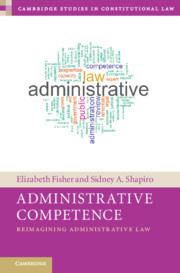Book contents
- Administrative Competence
- Cambridge Studies in Constitutional Law
- Administrative Competence
- Copyright page
- Dedication
- Contents
- Abbreviations
- Acknowledgments
- 1 The State We Are In
- Part I Making Administrative Competence Visible
- Part II Confronting the Origin Myths of Administrative Law
- Part III The Law of Public Administration
- Bibliography
- Index
Part I - Making Administrative Competence Visible
Published online by Cambridge University Press: 02 October 2020
- Administrative Competence
- Cambridge Studies in Constitutional Law
- Administrative Competence
- Copyright page
- Dedication
- Contents
- Abbreviations
- Acknowledgments
- 1 The State We Are In
- Part I Making Administrative Competence Visible
- Part II Confronting the Origin Myths of Administrative Law
- Part III The Law of Public Administration
- Bibliography
- Index
Summary
We ended Chapter 1 with a rallying cry to administrative lawyers to expand their imagination. While our language was stirring, delivering on that inspiration is not easy. In a 2010 New Yorker article, a former clerk of US Supreme Court Justice Stephen Breyer was quoted as saying of the justice: “Believe it or not, the thing that most excites him is administrative law.”1 The clerk’s claim reflects a general assumption that administrative law is the most dull of legal subjects – one that is often rated one of the “most boring classes and the one that the student is most clueless about at the end of the course.”2 Antonin Scalia, another US Supreme Court judge with a strong affinity for the subject, once described it as “not for sissies” given how unexciting it was.3
- Type
- Chapter
- Information
- Administrative CompetenceReimagining Administrative Law, pp. 27 - 100Publisher: Cambridge University PressPrint publication year: 2020

